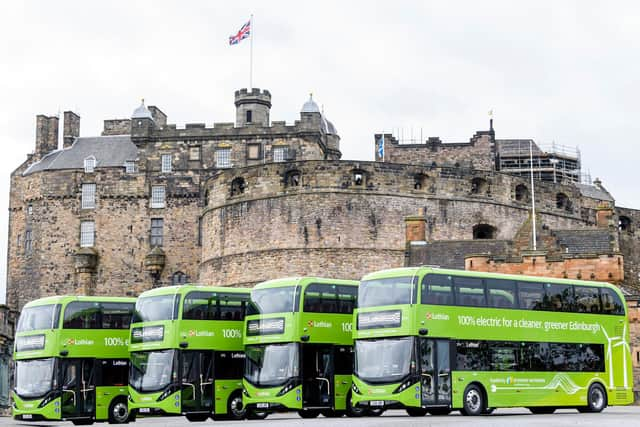Ambitious SNP-Greens target to scrap half of Scotland’s diesel buses by 2023 met with industry scepticism
The move will involve the majority of Scotland’s 4,000 buses by the end of 2023, and trains on the Fife Circle and Borders Railway by the following year.
The dates were included in the Scottish Government’s latest annual Programme for Government, which sets out policies for the year ahead.
Advertisement
Hide AdAdvertisement
Hide AdMost of the greener buses and the ScotRail trains involved are expected to be electric or battery, but it is not clear how much traditional electrification using overhead power lines will be required on the rail routes.


It was also announced that Scotland’s first hydrogen-powered train is due to be carrying passengers by 2025 after a prototype is showcased to coincide with the United Nations Cop26 climate change conference in November and it is trialled on the network in March.
The Scottish Government said it had already launched a “bus decarbonisation taskforce” and the first, £50 million phase of the Scottish Zero Emission Bus Challenge Fund.
However, an industry source expressed concern about the bus target being met and whether sufficient funding would be available.
They said the taskforce had yet to conclude was achievable and questioned why the 2023 date – an SNP manifesto commitment – had been set already.
The source said funding at current rates would only pay for around 650 of the 2,000+ new buses required.
So far, only 272 electric and hydrogen vehicles have been introduced.
Concern was also expressed that bus operators would be expected to pay the lion’s share of the cost when they were struggling financially after losing huge numbers of passengers during the Covid pandemic.
Advertisement
Hide AdAdvertisement
Hide AdJulianne Robertson, of Xplore Dundee, the city’s main operator, who also chairs Transform Scotland, told an election event held by the sustainable transport group in April that the 2023 pledge had “raised a few eyebrows” within the industry.
She said: “The worry might be this may put undue pressure on an industry which is scrambling to survive.
“We want the same things, but it may be slightly unfair to impose deadlines we worry might not be realistic.”
Paul White, director of the Confederation of Passenger Transport UK - Scotland (CPT), which represents operators, said today: “Achieving the [Scottish] Government’s decarbonisation targets will be challenging.
"Public transport use remains depressed, making it difficult to accelerate fleet investment.
"CPT continues to engage with Transport Scotland to address hurdles such as vehicle cost and charging infrastructure while looking to encourage other levers that will assist in decarbonising road transport, such as bus priority measures and modal shift to bus and active travel.
"We are committed to decarbonising the Scottish bus fleet, but this has to be a just transition that doesn’t disadvantage bus users while failing to address larger emitters such as the private car.”
A Transport Scotland spokesperson said: “Our ambition to remove the majority of fossil fuel buses from public transport by the end of 2023 is not something government can achieve alone.
Advertisement
Hide AdAdvertisement
Hide Ad“That is why within our first 100 days we convened the taskforce to agree with leaders from the energy, finance, bus manufacturing and bus operating sectors all the actions needed to transition to zero emission vehicles.”
It said the new fund was “designed to encourage the market to bring forward new and innovative ways to finance zero emission buses”.
A message from the Editor:
Thank you for reading this article. We're more reliant on your support than ever as the shift in consumer habits brought about by coronavirus impacts our advertisers.
If you haven't already, please consider supporting our trusted, fact-checked journalism by taking out a digital subscription.
Comments
Want to join the conversation? Please or to comment on this article.
